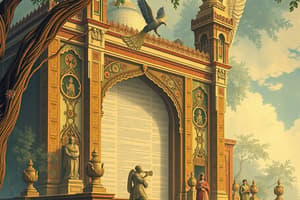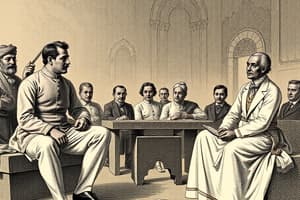Podcast
Questions and Answers
Which fundamental right prohibits discrimination on grounds of religion, race, caste, sex, or place of birth?
Which fundamental right prohibits discrimination on grounds of religion, race, caste, sex, or place of birth?
- Right to Education
- Right to Equality (correct)
- Protection against Forced Labour
- Freedom of Speech and Expression
What right allows foreigners to have equality before law?
What right allows foreigners to have equality before law?
- Prohibition of Traffic in Human Beings
- Right to Education
- Equality before Law (correct)
- Right to Freedom
Which article provides protection of life and personal liberty?
Which article provides protection of life and personal liberty?
- Article 20
- Article 15
- Article 25
- Article 21 (correct)
Which right is guaranteed under Article 19?
Which right is guaranteed under Article 19?
Which of the following is NOT a right protected under Article 30?
Which of the following is NOT a right protected under Article 30?
What does Article 21A ensure?
What does Article 21A ensure?
Which article deals with the prohibition of employment of children in factories?
Which article deals with the prohibition of employment of children in factories?
What does Article 27 ensure concerning religious taxes?
What does Article 27 ensure concerning religious taxes?
What was the main purpose of the transferred list described in the content?
What was the main purpose of the transferred list described in the content?
Which group was NOT intended to have a separate electorate according to the act?
Which group was NOT intended to have a separate electorate according to the act?
Which office was created as a result of the act?
Which office was created as a result of the act?
What significant voting right was provided for the first time by this act?
What significant voting right was provided for the first time by this act?
What was a key outcome of the 1935 Government of India Act?
What was a key outcome of the 1935 Government of India Act?
Which of the following lists was introduced in the federal system according to the act?
Which of the following lists was introduced in the federal system according to the act?
Which provinces introduced bicameralism as mentioned in the content?
Which provinces introduced bicameralism as mentioned in the content?
What type of service commissions were established by the act?
What type of service commissions were established by the act?
Which right allows citizens to gather peacefully for public meetings without arms?
Which right allows citizens to gather peacefully for public meetings without arms?
What does the right to freedom of movement allow citizens to do?
What does the right to freedom of movement allow citizens to do?
Which right protects citizens from the unauthorized tapping of their phone conversations?
Which right protects citizens from the unauthorized tapping of their phone conversations?
What is included in the freedom of profession?
What is included in the freedom of profession?
Which freedom allows citizens to form political parties and organizations?
Which freedom allows citizens to form political parties and organizations?
What is the purpose of the right to freedom of residence?
What is the purpose of the right to freedom of residence?
What does the right against pre-censorship on a newspaper refer to?
What does the right against pre-censorship on a newspaper refer to?
Which of the following rights does NOT include a right to strike?
Which of the following rights does NOT include a right to strike?
What is the main purpose of preventive detention?
What is the main purpose of preventive detention?
Which of the following forms of trafficking is explicitly prohibited under Article 23?
Which of the following forms of trafficking is explicitly prohibited under Article 23?
What does the term 'begar' refer to as mentioned in Article 23?
What does the term 'begar' refer to as mentioned in Article 23?
Which of the following is NOT included in the definition of forced labour according to Article 23?
Which of the following is NOT included in the definition of forced labour according to Article 23?
Under Article 24, which age group is prohibited from being employed in factories or hazardous activities?
Under Article 24, which age group is prohibited from being employed in factories or hazardous activities?
The exception to the prohibition of forced labour in Article 23 allows the state to impose which of the following?
The exception to the prohibition of forced labour in Article 23 allows the state to impose which of the following?
Which act regulates the prohibition of child labour in employment sectors excluding harmless or innocent work?
Which act regulates the prohibition of child labour in employment sectors excluding harmless or innocent work?
Which of the following is emphasized as legally punishable under Article 23?
Which of the following is emphasized as legally punishable under Article 23?
Which of the following statements is true regarding the issuance of certain offices?
Which of the following statements is true regarding the issuance of certain offices?
What does Article 33 of the Indian Constitution empower the parliament to do?
What does Article 33 of the Indian Constitution empower the parliament to do?
Which criticism is not mentioned concerning fundamental rights?
Which criticism is not mentioned concerning fundamental rights?
The directive principles of state policy are derived from which constitution?
The directive principles of state policy are derived from which constitution?
Which of the following best describes the nature of the directive principles of state policy?
Which of the following best describes the nature of the directive principles of state policy?
What phrase represents the combined essence of fundamental rights and directive principles?
What phrase represents the combined essence of fundamental rights and directive principles?
The directive principles aim to achieve high ideals as mentioned in which part of the constitution?
The directive principles aim to achieve high ideals as mentioned in which part of the constitution?
What is a key feature of the directive principles of state policy?
What is a key feature of the directive principles of state policy?
Flashcards are hidden until you start studying
Study Notes
1935 Government of India Act
- This act attempted to create an All-India federation with British provinces and princely states
- The attempt failed due to disapproval from the princely states
- This abolished direct rule in provinces and introduced Provincial autonomy
- The Act provided for a bicameral legislature in 6 out of 11 provinces: Bengal, Bombay, Madras, Bihar, Assam, and the United Provinces
- This act introduced a federal structure with three lists: Federal, Provincial, and Concurrent
- This act established a Federal Court in Delhi in 1937
- This act introduced separate electorates for the depressed classes (Scheduled Castes) and women
Fundamental Rights
- Available to both citizens and foreigners:
- Equality before the law and equal protection of the laws
- Protection in respect of conviction for offences
- Protection of life and personal liberty
- Available to citizens only:
- Prohibition of discrimination based on religion, race, caste, sex, or place of birth
- Equality of opportunity in matters of public employment
- Protection of six rights regarding freedom of:
- Speech and expression
- Assembly
- Association
- Movement
- Residence
- Profession
- Protection of language, script, and culture of minorities
- Right of minorities to establish and administer educational institutions
- Right to elementary education
- Protection against arrest and detention in certain cases
- Prohibition of traffic in human beings and forced labour
- Prohibition of employment of children in factories, mines, and other hazardous activities
- Freedom of conscience and free profession, practice, and propagation of religion
- Freedom to manage religious affairs
- Freedom from payment of taxes for the promotion of any religion
- Freedom from attending religious instruction or worship in certain educational institutions
Right to Equality
- Includes the right to propagate one's views as well as the views of others
Freedom Of Speech and Expression
- Includes the right of the press, commercial advertisement, and telecasting.
Freedom of Assembly
- All citizens have the right to assemble peacefully and without arms
- This right can be exercised on public land and the assembly must be peaceful and unarmed
Freedom of Association
- Includes the right to form political parties, companies, partnership firms, societies, clubs, organizations, trade unions, or any body of persons.
Freedom Of Movement
- Enables every citizen to move freely throughout the territory of the country
Freedom of Residence
- Allows citizens to reside and settle in any part of the territory of India
- Includes the right to reside temporarily and the right to settle permanently
Freedom of Profession
- Provides all citizens with the right to practice any profession or to carry on any occupation, trade, or business.
Protection Against Arrest and Detention
- Detention can be punitive (to punish a person for an offence committed) or preventive (to prevent a person from committing an offence in the future).
Rights Against Exploitation
- Prohibition of Traffic in Human Beings and Forced Labour:
- Traffic in human beings includes selling and buying men, women, and children like goods, immoral traffic in women and children, devadasis, and slavery.
- Begar refers to compulsory work without remuneration.
- Forced labour means compelling a person to work against their will.
- The State can impose compulsory service for public purposes (e.g., military service or social service).
- ** Prohibition of Employment of Children in Factories**:
- Prohibits employing children under the age of 14 in factories, mines, and other hazardous activities
- Allows for employing children in harmless or innocent work.
- The Child Labour (Prohibition and Regulation) Act 1986 is a key law in this area.
- The government banned the employment of children as domestic servants or workers in business establishments.
Armed Forces and fundamental rights
- The Parliament can restrict or abrogate the fundamental rights of members of the armed forces, para-military forces, police forces, intelligence agencies, and analogous forces.
Martial Law and Fundamental Rights
- Fundamental rights can be restricted while martial law is in force in any area within the territory of India.
Criticism of Fundamental Rights
- Excessive limitations
- Lack of social and economic rights
- Lack of clarity
- Lack of permanency
- Suspension during emergency
- Expensive remedy
- Preventive detention
Directive Principles of State Policy
- Part IV of the Constitution enumerates Directive Principles of State Policy (Articles 36-51).
- These principles are inspired by the Irish Constitution (1937) which in turn was inspired by the Spanish Constitution.
- Dr. B.R. Ambedkar described these principles as novel features of the Indian Constitution.
- Along with Fundamental Rights, Directive Principles of State Policy contain the philosophy and the conscience of the Constitution.
Features of the Directive Principles of State Policy
- These principles guide the state in formulating policies and enacting laws.
- They are a broad, economic, social, and political program for a modern democratic state, aiming to realize the ideals of justice, liberty, equality, and fraternity outlined in the Constitution's Preamble.
Studying That Suits You
Use AI to generate personalized quizzes and flashcards to suit your learning preferences.




